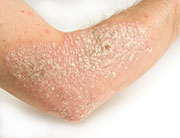- Are You Making This Expensive Thermostat Error This Winter?
- Recognizing the Signs of Hypothyroidism
- 10 Strategies to Overcome Insomnia
- Could Artificial Sweeteners Be Aging the Brain Faster?
- Techniques for Soothing Your Nervous System
- Does the Water in Your House Smell Funny? Here’s Why
- Can a Daily Dose of Apple Cider Vinegar Actually Aid Weight Loss?
- 6 Health Beverages That Can Actually Spike Your Blood Sugar
- Treatment Options for Social Anxiety Disorder
- Understanding the Connection Between Anxiety and Depression
Steroids Often Prescribed for Psoriasis, Countering Guidelines


Although corticosteroid pills are not recommended for the management of psoriasis, new research reveals these drugs are commonly prescribed by dermatologists treating this chronic skin condition.
Corticosteroids, including prednisone, dexamethasone and methylprednisolone, were the second most commonly prescribed systemic medications (not preparations applied to the skin) for psoriasis, according to a study from Wake Forest Baptist Medical Center.
“Expert guidelines discourage their use for psoriasis due to concerns about causing flares of generalized pustular psoriasis, but there are no randomized controlled trials of systemic corticosteroids in psoriasis to look at these issues,” study co-author Scott Davis, assistant director of the Center for Dermatology Research at Wake Forest Baptist Medical Center, said in a Wake Forest news release.
In conducting the study, recently published online in the Journal of Cutaneous Medicine and Surgery, the researchers examined survey data collected on systemic medications used to treat psoriasis from 1989 to 2010.
Out of 21 million office visits, corticosteroids were prescribed 650,000 times. The study’s authors noted the vast majority, or 93 percent, of these prescriptions were written by dermatologists.
“Psoriasis has an enormous impact on patients’ lives, and there have been major recent advances in treatment,” Davis noted. “While the new treatments are highly effective and appear very safe, they are costly; their effects are well studied. In contrast, while corticosteroids have been available for decades, their use in psoriasis has not been extensively studied.”
More information
The American Academy of Dermatology has more about psoriasis treatment.
Source: HealthDay
Copyright © 2026 HealthDay. All rights reserved.










